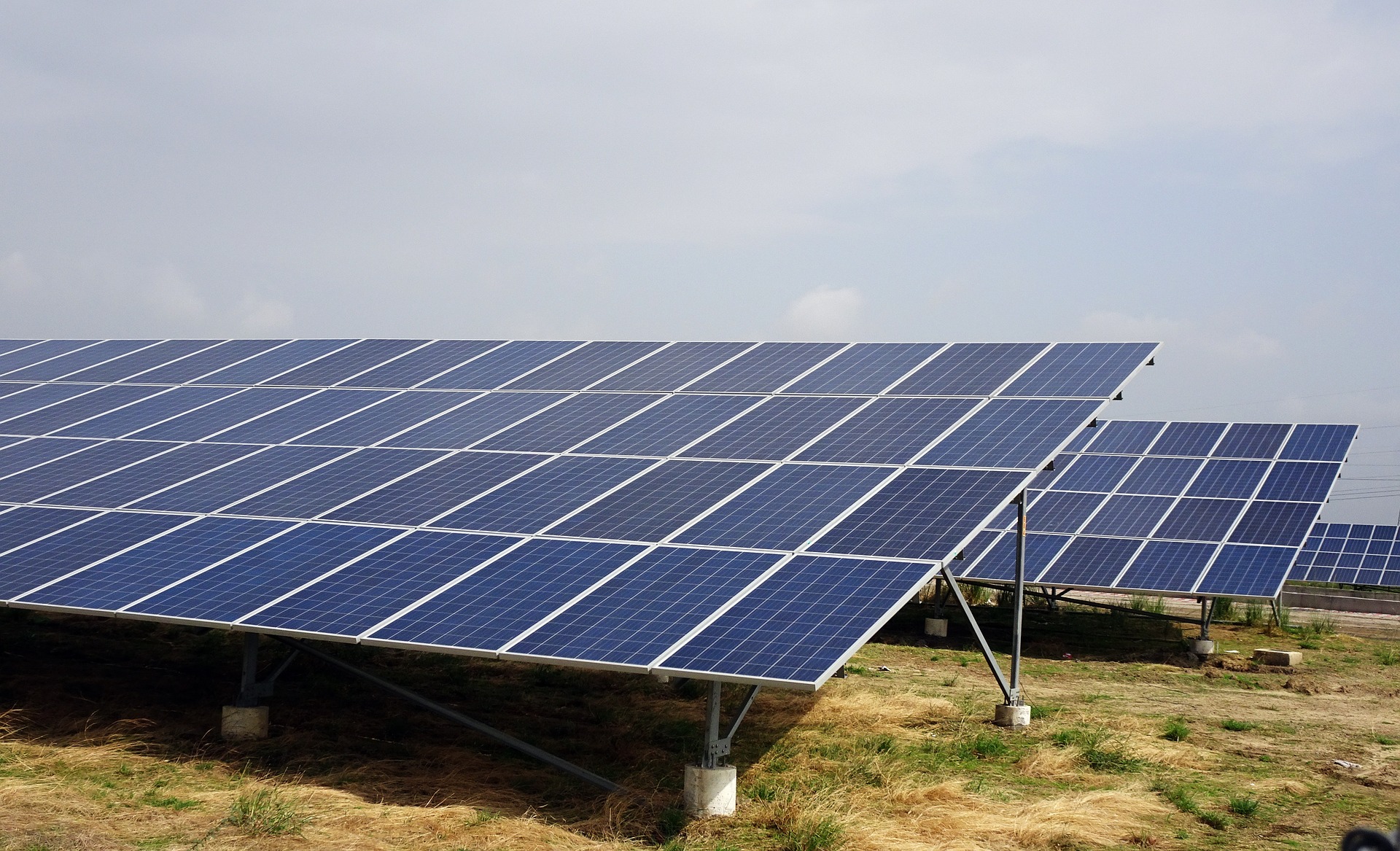The term community solar generally refers to a shared solar PV project which is open to multiple subscribers, but there is no set definition as such. The community solar approach removes many of the barriers to entry for those who want to go solar but are unable to install panels on their own property. With a community solar subscription, subscribers receive bill credits proportional to the energy generated by their subscribed share of the solar PV project. In this article, we will look at three different models of community solar—utility, private, and non-profit.
Community Solar Project Models
There are a number of different community solar project models, and each comes with its own unique set of costs, benefits, responsibilities, and rewards. Three of the main community solar project models, which we will explore further throughout this article, are:
- Utility-Sponsored Model: A utility owns/operates a community solar project, which is open to voluntary ratepayer participation.
- Special Purpose Entity (SPE) Model: Individual investors join a business enterprise to develop a community solar project.
- Non-Profit Model: Donors make contributions to a community solar installation, which is owned by a charitable non-profit organization.
Issues to Consider Before Selecting a Community Solar Project Model
There are advantages and disadvantages to each of these community solar models and a number of issues to consider before selecting a project model. Some of the main issues to consider include the following:
- Cost & Benefit Allocation: A number of questions must be considered with regard to the allocation of costs and benefits relating to the community solar project. Who will pay for planning, construction, and operation of the system? Who will have rights to the electricity produced, renewable energy certificates (RECs), revenue from electricity sales, tax benefits, other incentives, and asset ownership?
- Financing & Taxes: Questions relating to financing and taxation issues must also be answered. Firstly, how will the money for the project be raised—equity financing, debt financing of a business entity, charitable donations, etc.? Secondly, what are the tax implications for participants? Will the project generate taxable income, tax credits, tax deductions, etc.?
- Legal Issues: The project design must address regulations concerning securities, utilities, and business, as well as the complexity of the agreements between all project participants.
The following chart, courtesy of the U.S. Department of Energy, offers a comparison between these models with regard to a number of key factors.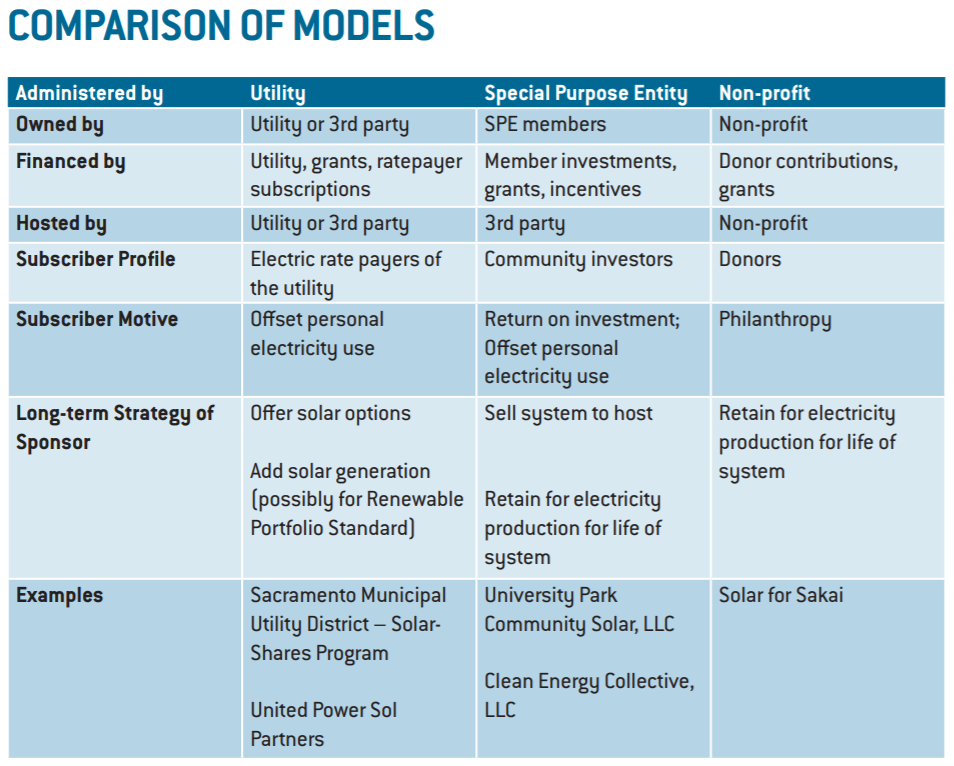
Utility-Sponsored Community Solar
The utility-sponsored community solar model is extremely popular as electric utilities are likely to have the necessary infrastructure (legal, financial, program management) in place to organize and implement a community solar project. Generally, utility customers will participate in the community solar project via an upfront payment or an ongoing payment. In exchange for their contribution, customers receive an electricity bill credit proportional to their contribution and how much electricity the solar PV project produces. The customer does not have any ownership stake in the solar project, but instead is paying for the rights to benefit from the energy generated by the system. The system itself is usually owned by the utility company or a third party.
It should also be noted that utility-sponsored community solar programs are distinct from utility “green power” programs. “Green power” programs sell RECs from multiple renewable energy sources, whereas utility-sponsored community solar programs sell energy/energy rights from a single, specific solar PV project, with or without RECs.
Typically, there are a number of enrollment options available to potential subscribers, including:
- Single payment upfront
- Payment spread out over an installment plan
- Monthly subscription with no upfront fee
The monthly subscription option, in particular, makes solar energy more accessible and affordable for a wider range of customers. The graphic below, courtesy of ‘A Guide to Community Solar: Utility, Private, and Non-profit Project Development’ by the U.S. Department of Energy, shows the relationship between participants in a utility-sponsored community solar project.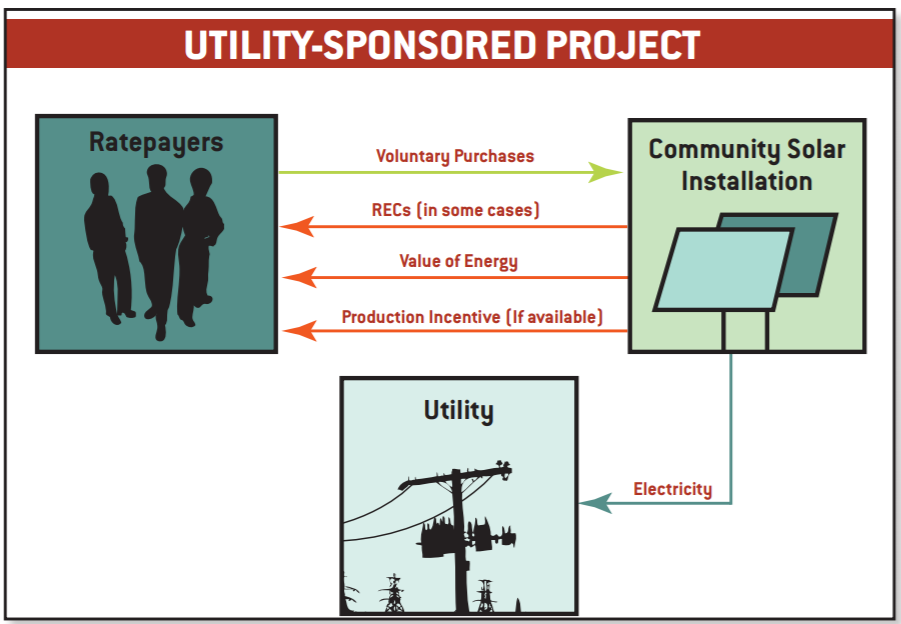
Special Purpose Entity (SPE) Community Solar
In order to best take advantage of the tax incentives available for commercial solar PV projects, organizers of the community solar project may choose to structure it as a business. In states across the country, a wide range of business entities could be suitable for a participant-owned community solar project. However, there are challenges to adapting commercial solar structures for community solar projects, including:
- Making full use of the available tax benefits when the community investors have limited tax appetite and a lack of passive income.
- Maintaining community project identity when engaging with non-community-based, tax-motivated investors.
- Working with limits on the number of unaccredited investors if the project is to be exempt under securities laws.
Developing a community solar project using the SPE model entails a significant level of complexity. Forming a business, raising capital, and running a business presents a number of legal and financial hurdles, while developing a community solar project brings about challenges of its own. Contracts must be negotiated between the participants/owners, the site host, and the utility company, and legal & financial processes for sharing benefits must also be outlined.
Owing to the complexity of developing a community solar project under the SPE model, many of the real-life examples of SPE community solar projects involve existing business entities with the prerequisite legal and financial savvy to pursue such a project. The graphic below, again courtesy of ‘A Guide to Community Solar: Utility, Private, and Non-profit Project Development’ by the U.S. Department of Energy, shows the relationship between the different parties involved in a special purpose entity community solar project.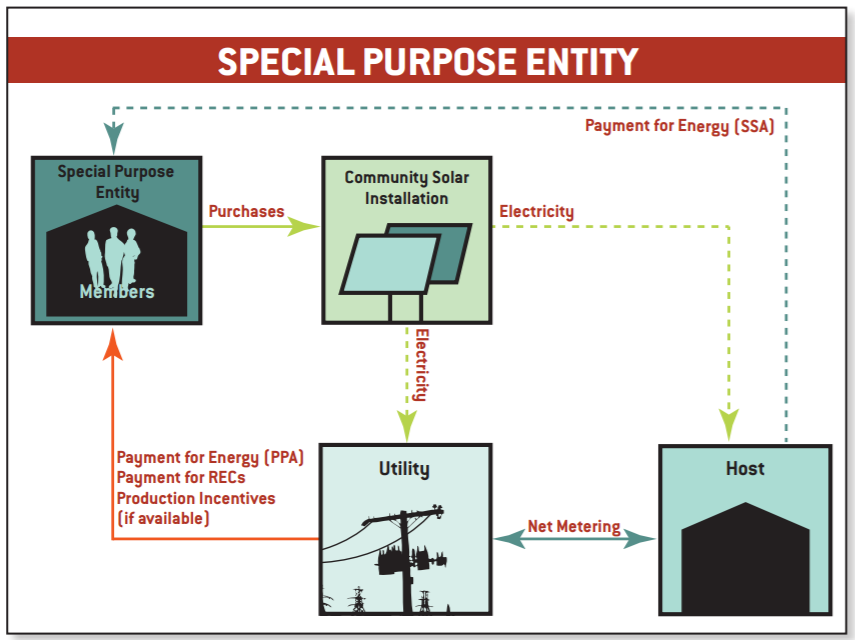
Non-Profit Community Solar
This is a somewhat unique model as it is not “community solar” in the strictest sense of the term, as donors do not receive a direct benefit from the solar PV project. They do, however, share indirectly in the benefits, by lowering energy costs for their favored non-profit and prioritising environmental leadership in the community. With the emergence of policies like virtual net metering, however, it may become possible for a non-profit project sponsor to share these benefits with donors/members. Additionally, a non-profit could also partner with a third-party for-profit entity, allowing this third party to own & install the system and receive the tax benefits.
The non-profit model of community solar has been popular with institutions like schools and churches, who have partnered with local citizens to develop solar PV projects. Supporters of these non-profit organizations help to finance the system through tax-deductible donations. Although non-profit community solar projects are not eligible for the federal investment tax credit (ITC), they may be able to avail of other grants/foundation funding which would not be available for commercial projects. The graphic below, again courtesy of ‘A Guide to Community Solar: Utility, Private, and Non-profit Project Development’ by the U.S. Department of Energy, shows the relationships between participants under the non-profit community solar model.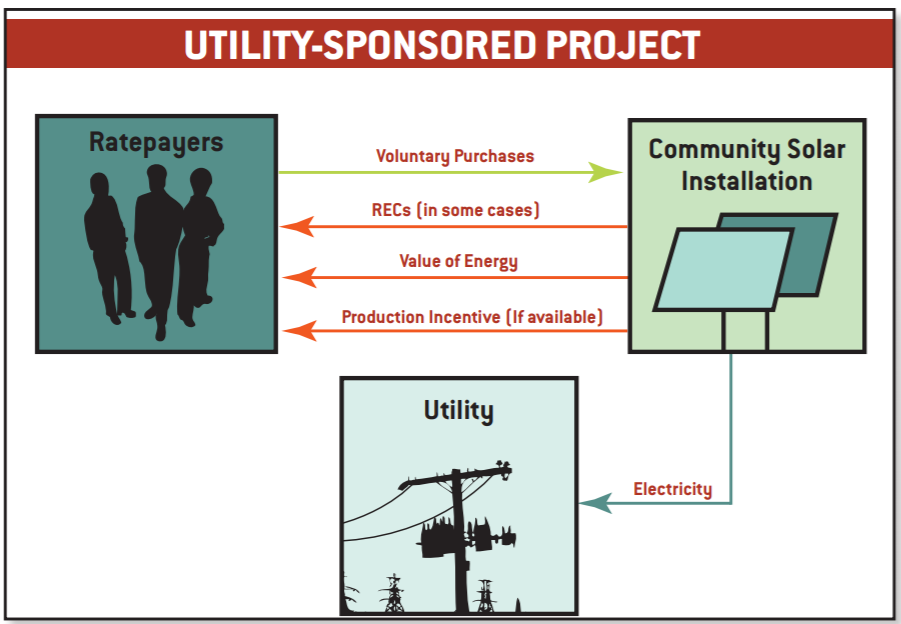
A detailed exploration of community solar for utility, private, and non-profit project development is available for download here, courtesy of the U.S. Department of Energy. This document offers more in-depth information on the topics explored throughout this article, as well as examples of each of the different models of community solar.
Interested in New York community solar? YSG is now accepting subscribers for The Pitkin Project, an East Brooklyn community solar garden serving all five NYC boroughs—the Bronx, Brooklyn, Manhattan, Queens, and Staten Island. To learn more, send us an email or call at 212.389.9215 today.
YSG Solar is a project development vehicle responsible for commoditizing energy infrastructure projects. We work with long-term owners and operators to provide clean energy assets with stable, predictable cash flows. YSG's market focus is distributed generation and utility-scale projects located within North America.
Sources:
All information in this article is courtesy of the document, ‘A Guide to Community Solar: Utility, Private, and Non-profit Project Development’, created by the U.S. Department of Energy. Images used throughout are also from the same source.

